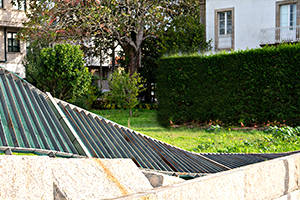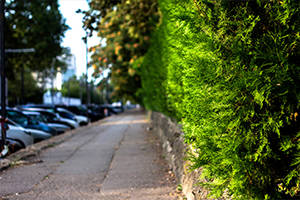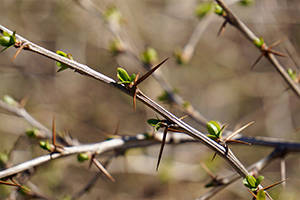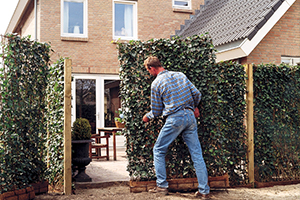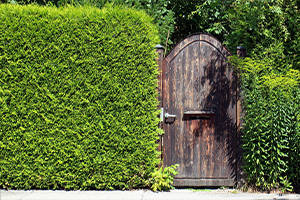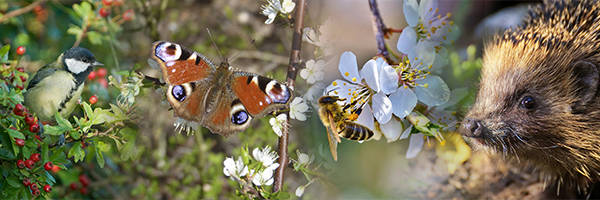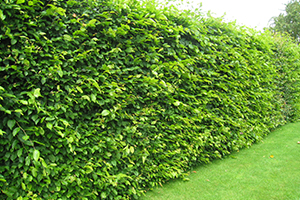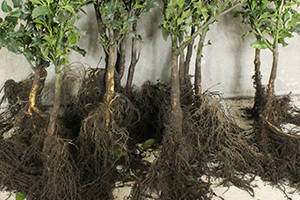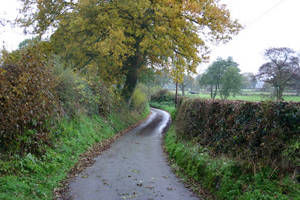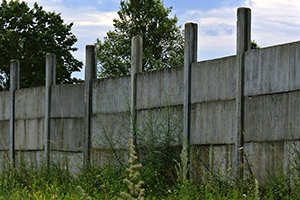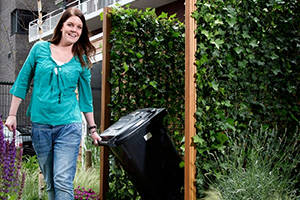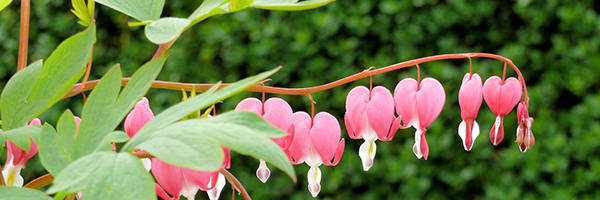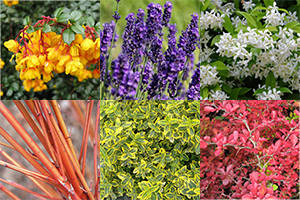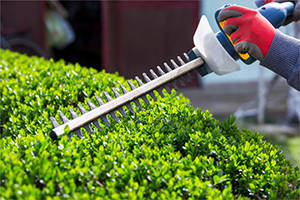
Why Plant A Hedge?
iIntroduction
So, why should you plant a hedge? Hedges, fences and walls all provide boundaries around our gardens, but hedges have many advantages over the man-made alternatives that make them appealing for a number of reasons. Here we summarise why planting a hedge is a cost-effective, environmentally-friendly and attractive option for your garden.
Protection From and Resistance To Wind
One of the overwhelming reasons to plant a hedge is to provide shelter from winds. Unlike a wall or fence, which divert the wind upwards over the obstruction creating turbulence, a hedge filters and calms it, which leads to improved air circulation and the formation of a sheltered micro-climate. In the garden, this gives better growing conditions as a result of warmer soil. In seaside areas, a hedge is particularly useful in reducing salt erosion and damage to foliage from salt and sand.
In severe windy weather, a hedge won’t fall and sustain damage in the same way as a fence or wall, as its construct is strong yet flexible, allowing some of the air to pass through and lessen the pressure being exerted on it. Loss of foliage or broken branches may occur but requires no intervention as they will grow back naturally.
A wall or a fence is a solid object in the path of the wind therefore they experience the full force of the wind with no means of lessening it. Not only does this create more turbulence as the wind is forced up and over them, it also leaves them far more prone to collapse or damage and with climate change, the instances of severe storms are forecast to become more frequent and by default the damage that they can cause.
Environmental Benefits
Evergreen hedges, particularly dense evergreens, are firstly a useful way to reduce noise levels (reduce but not eliminate). The degree of sound deadening is directly influenced by the height, maturity and density of a hedge, and particularly by the elevation of the source of the noise, a noise from above the garden level being more difficult to reduce.
Secondly, hedges and hedging screens all have the ability to absorb harmful toxins and particles emitted by traffic, filtering out around 50% of the toxins and particulate matter to provide significantly cleaner air in the vicinity, and benefit general health and wellbeing. Dense evergreen hedging in particular, is ideal, as it is in leaf year-round and is especially beneficial in highly trafficked environments, in areas where children play outside or where herbs and vegetables are grown.
Children in particular are at higher risk from traffic pollution as they are smaller therefore more susceptible to breathing in exhaust fumes. Hedging and green screens such as Ivy screens are now being looked at quite widely for use around children's play areas and schools in order to provide a level of protection against air pollution from traffic and so help to prevent lung conditions such as asthma from being so prevalent. View our page on
hedging and air pollution here. 
Cost Effective
Planting a hedge is a DIY project for most people and all you need is a free day, a spade, (see our fabulous range of gardens tools here), plants and some compost to give your hedge a good start (unless you're in a rural area where you might need rabbit guards). The initial purchase cost of hedging plants and feed can be as low cost or expensive as you choose depending on species and size of plant. The cost is considerably lower if you use smaller cell grown hedging plants or the even less expensive bare root plants most of which are deciduous but there are some evergreen species (Cherry Laurel, Box, Holly , Yew and Privet). We've designed our website so that you can quickly compare the cost of various hedge plants, a lot depends on whether you have the patience to order smaller plants (which are much cheaper) and wait an extra year or two for them to mature.
Once you've planted your hedge, trimming doesn't require an expert hand as most people quickly pick up the know-how and techniques, and compared to the regular expense of maintenance or repair of man-made options with fence treatments or pointing, or even in the case of damage full replacement or re-build, hedge trimming will then only cost a few hours of your time and a hedge will repair and replace its own foliage and branches naturally, so there is no additional cost.
Crime Prevention
Although a tall fence or wall is difficult to scale, it's not impossible and fence panels can be removed. Certain species of hedging however, have dense habits and long thorns which make climbing over or through them almost impossible without injury. Thorny or spiny hedges are tremendously off putting to burglars or trespassers.
Particularly where your boundary is vulnerable, think about
Hawthorn,
Pyracantha and
Berberis . It is thought that crime rates are lower in green areas and even that people are inclined to drive more slowly down a hedge lined street.
To see our full range of security hedging, visit our intruder proof hedging page.
Privacy
Smaller leaved, dense, evergreen hedges are almost impossible to see through and are an ideal privacy screen for homes in busy areas with lots of passing traffic and footfall, or for creating a private garden space anywhere. Being evergreen, they will provide privacy cover all year round.
If space is an issue or you're looking for privacy and security, we have a range of Ivy Screens and Hedging Screens that will fit the bill! Pre-grown in narrow troughs over a galvanised steel framework, these screens offer an instant green, privacy solution, are simple to install and fit into the narrowest of spaces. Popular in urban areas where space is at a premium, they are also natural pollution absorbers , making them ideal for external leisure spaces, around schools and as green barriers along roadsides.
Attract and Help to Conserve Wildlife
Many species of birds, insects and small mammals use hedges to provide shelter, safety from predators and food via the flowering and fruiting varieties. Hedges encourage wildlife and bio-diversity, helping to conserve our native wildlife species, of which the most important species have declined by around 60% since 1970. Today, a quarter of UK mammals and almost half the birds recently assessed, are now at risk of extinction due to loss of habitat and pollution. Hedges popular with birds are
Hawthorn with luscious red haws in Autumn, or the berries on a
Laurel,
Pyracantha or
Holly. Insects beneficial to the garden love
Lavender and
Oleaster. Always check that fledglings have left their nest before clipping your hedge. The occupied nests of all wild birds are protected by law.
Help With Drainage and Excess Groundwater
Hedges are natural sponges for water and can help to soak up excess groundwater and assist in land drainage. This can promote better growing conditions for plants but can also protect against water ingress from garden to home, or to reduce sitting groundwater in fields and paddocks after periods of heavy rain, improving conditions for both animals and crops.
There are a number of species more suited to wetter ground conditions such as Alder and Willow, with Hornbeam being a better option than it's close cousin, Beech, in moderately wet soils. However, for soil that is exceptionally wet or waterlogged for long periods as a norm, hedging isn't a suitable option without additional drainage.
Stabilise Land
With a strong and abundant root system, hedging can help to stabilise land, and protect local eco-systems in adverse weather conditions. Particularly beneficial for the countryside, they provide a stable boundary to field edges protecting both wildlife and livestock as well as the integrity of the field edge, by preventing erosion.
Hedging roots, on average, usually extend to around 18 inches below ground and spread out in a filament type network that holds the soil around it in place. Some hedging plants such as Laurels can also have deep tap roots. It is worth nothing however, that in heavy or clay soils, hedging roots may develop a less prolific structure due to the soil conditions.
If planting hedging in your garden, do be considerate of your neighbours and aware of your responsibilities when maintaining your hedge.
Hide Unattractive Features
We don't all have great views from every window and a hedge can quickly mature to whatever height is appropriate to block the view of rubbish bins, washing lines, compost heaps, or ugly buildings.
This is particularly useful if you need a high screen, when the cost implications of walls and fences becomes even more persuasive in favour of hedges.
See our full range of fast growing hedging here or for instant screening options see either our Ivy Screens or Hedging Screens pages.
Frame Garden Features
The dark background of an established hedge is the perfect canvas to help to focus the gardener's eye onto the plants in the foreground. Hedges are used by garden designers to help enhance colourful plants and herbaceous borders, which are shown to great effect in front of a hedge.
For a hedge with leaf cover all year round, see our full range of
evergreen hedging here.Add Colour
Many hedge species bring a wealth of colour and seasonal interest to the garden all year round. Leaves in shades of green, grey, yellow, cream, lime, copper and purple, as well as blossom, flowers, fruits and berries - a carefully chosen hedge will reward the gardener with colour throughout the seasons.
See our flowering hedging, hedging with berries and hedging with colourful foliage pages for more information.
Low Maintenance
All hedges require some maintenance, but fences need to be painted and the panels over its lifetime will need to be replaced when rotted or wind-damaged. Ok, perhaps walls don't need a lot of maintenance, unless damaged - even we'll admit that walls can have the edge over a hedge when it comes to low maintenance. However, when you factor in the cost, the visual aspects, environmental appeal and sustainability, we naturally think a hedge is the better option overall.
Think carefully though when choosing a hedge about the maintenance requirement if this is a top consideration - we specify the frequency of clipping needed for each species on the "Pruning Advice" tab on each species page. Whilst Leylandii, our fastest growing of all the hedges will need trimming 2-3 time a year to keep it under control, there are some hedging plants which thrive on a simple trim once a year, and can even be left for longer if a more natural and less clipped look is what you prefer.

Sustainability
In comparison to a fence, a hedge is a cheaper investment yet can last a lifetime, saving on replacement or repair costs as well as material resources. As it also acts as a wildlife habitat, helps to regulate local climate and pollution and can help drainage and land stability. Hedges are not just cost-effective, but provide ecological and environmental sustainability also.
A hedge over its lifetime gives far more back to the environment than it takes and it is this fact that makes it a truly sustainable option over a wall or a fence.
House Value
We have seen research that shows that house prices tend to be higher in streets that are greener, and crime rates lower. Greenery in general, especially if it's well presented and cared for, contributes towards the kerb appeal of your property.
So, if you want to make the most of your home and garden and benefit from all the positives that a hedge can bring as well, including potentially increasing the value of your home, plant a hedge and make a truly worthwhile investment!
If you are thinking about planting a hedge, a great starting point is our
Choosing The Right Species Page which has recommendations by category to give you a complete overview and lots of choice! Alternatively, you can call our friendly and helpful sales and advice team on
01257 263 873 or email
[email protected]Show more >>>
Show less <<<


